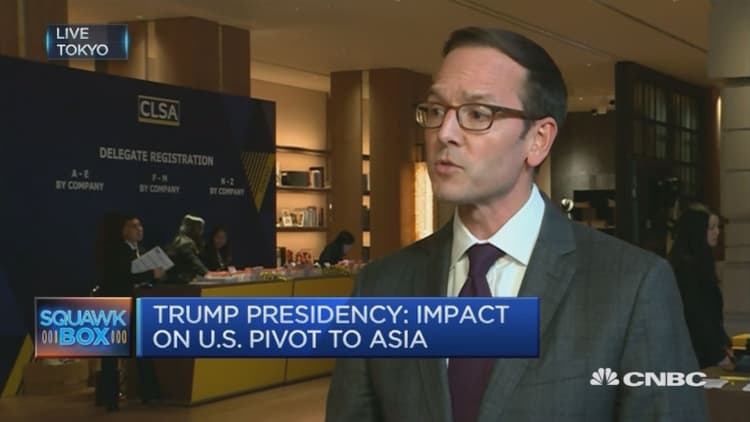
North Korea can generate a lot of instability and will probably be "the single most defining geopolitical challenge" for the Trump administration, a former Asia director at the U.S. National Security Council said.
Evan Medeiros, who was at the NSC from 2009-2015 and the top Asia advisor from 2013-2015 during the presidency of Barack Obama, told CNBC's "Squawk Box" on Tuesday he was concerned the crisis over North Korea's nuclear weapons program could escalate.
While diplomacy, sanctions, deterrents and military actions were always on the table, expectations for talks with North Korea should likely be low, Medeiros, who is currently a practice head for Asia at consultancy Eurasia Group.
"North Korea doesn't want to give up its nuclear weapons. Nuclear weapons are key to its survival," he said. "Talks for North Korea are really about getting sanctions relief, playing for time, playing for advantage, trying to get sanctions lifted. And so if that's the case, I think Trump's tolerance and the tolerance of the Chinese may actually be somewhat limited."
Medeiros expressed concern about how U.S. President Donald Trump might react.
"What I worry about is Trump, understanding that his options are relatively limited, feeling like he's a great negotiator, as he tells us all, that he might give talks a try only to learn the lesson that several other American presidents and Japanese prime ministers and South Korean presidents have learned, which is, the North Koreans really aren't serious about talks at all," he said. "In which case, in a year, we could find that the effort at initial talks failed and we're in an escalating crisis."
Concerns about North Korea's nuclear program, and its missile development resurfaced earlier this month when the pariah nation launched a missile, which media reports said flew about 500 km (300 miles) into the Sea of Japan.
The test launch, which came as Trump hosted Japanese Prime Minister Shinzo Abe in Palm Beach, Florida, marked a significant step forward for North Korea's ballistic missile program.
To be sure, so far Trump's response to North Korea has been fairly low key.
Responding to the missile test, Trump and Abe issued a joint statement in which Abe called the launch "absolutely intolerable." Trump, not generally known for verbal restraint, made no direct reference to the launch at all but rather pledged "100 percent" support for Japan, calling it a "great ally."
But Medeiros also cited the potential for South Korea's political crisis to spur tension.
Late last year, South Korea's conservative President Park Geun-hye was impeached amid a scandal over influence peddling. Her presidential power has been suspended.
The Constitutional Court was expected to rule before June on whether to approve the impeachment, which would set the stage for new elections.
Medeiros expected that South Korea would swing to a center-left political leader, and that could also spur fresh tension over North Korea.
"The connectivity between Donald Trump, who is very right [wing], and a new center-left South Korean president would be relativity difficult.
And Trump may not be in the mood to go down the dialogue avenue when the South Koreans are," Medeiros said.
"What I worry about is we could enter into a period in which there is South Korea-U.S. friction over North Korea, U.S.-China friction and then China-South Korea friction," Medeiros said. "That's exactly what North Korea would want. That scenario gives them the maximum negotiating space and the maximum ability to play everybody off one another. "
—Evelyn Cheng and Clay Dillow contributed to this article.
—By CNBC.Com's Leslie Shaffer; Follow her on Twitter @LeslieShaffer1


